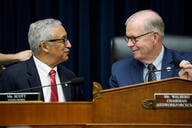You have /5 articles left.
Sign up for a free account or log in.
- Kentucky's attorney general, Greg Stumbo, on Friday issued an opinion saying that the University of Kentucky and the University of Louisville violated the state's Marriage Amendment, which restricts marriage to male-female couples, when the universities created domestic partner benefits for their employees. The problem with the benefits programs, Stumbo said, is that they establish criteria for domestic partner status, and thus violate a part of the amendment that bars the state from creating any same-sex status "substantially similar" to marriage. Stumbo told The Louisville Courier-Journal that the universities could legally offer benefits to couples of any sex who are not married if the universities just said that they would provide the benefits to anyone who lives with a university employee. University officials told the newspaper that they were still studying the opinion. The attorney general's opinion does not carry the force of law, but Stumbo indicated that he would sue the universities if they do not change their policies.
- The National Science Foundation has released more evidence showing the rebound in foreign enrollments in the United States. In 2005, first-time graduate enrollments of foreign students in science and engineering was up 4 percent over 2004, the first increase since 2001. While total foreign enrollments in science and engineering were down, the first-time enrollment figure is considered crucial because most programs last several years. The NSF data are consistent with a series of surveys from the Council of Graduate Schools, which have found that the post-9/11 drops are being reversed.
- Gregory Geoffrey, president of Iowa State University, announced Friday that he was denying a tenure appeal from Guillermo Gonzalez, whose supporters say that colleagues in the physics and astronomy department rejected his tenure bid because of his support for "intelligent design," a theory used to challenge the overwhelming scientific consensus about evolution. In his statement, Geoffrey said that he could not say much about any personnel decision, but he said that he based his decision on such factors as Gonzalez's publication record, his ability to attract outside grants, and the number of graduate students he has supervised. The Discovery Institute, an anti-evolution group, denounced Geoffrey's decision and blamed it on hostility to intelligent design. The Des Moines Register reported that its analysis of Gonzalez's record found that he obtained but a fraction of the average grant totals his departmental colleagues earned.
- A professor who is executive director of the Center for Biomedical Innovation at the Massachusetts Institute of Technology is leaving the university to protest its decision not to reconsider a controversial tenure denial, The Boston Globe reported. Frank L. Douglas, the professor who is quitting, sent an e-mail to officials there in which he said that they broke an agreement to reconsider the tenure bid of James L. Sherley -- a pledge that MIT says it never made. Sherley, who is black, says that racial discrimination was a factor in his tenure review. Sherley went on a 12-day hunger strike in February and has indicated that he may resume the hunger strike if MIT does not reconsider his case. Faculty members involved in the case have said that race had nothing to do with their tenure decision.
- The Connecticut House and Senate have now passed legislation to allow students who finish four years of high school in the state, and who lack the legal right to be in the United States, to pay in-state tuition rates at public colleges and universities in the state, The New Haven Register reported. Gov. Jodi Rell has not indicated if she will sign the bill.
- Syracuse University announced Friday that it would be adding a women's ice hockey team in 2008-9, and that it was dropping its men's and women's swimming and diving teams after the 2007-8 season. University officials cited the expense of making the swimming and diving teams' facilities state of the art, the high level of interest in hockey in upstate New York, and the importance of complying with Title IX of the Education Amendments of 1972.
- Alexander C. McCormick is moving from directing the Carnegie Classifications, at the Carnegie Foundation for the Advancement of Teaching, to become the new director of the National Survey of Student Engagement, effective in 2008. NSSE, which has become increasingly influential as colleges look for ways to document their effectiveness, was created by George Kuh at the Indiana University Center for Postsecondary Research. Kuh will continue to direct the center.
- The University of Illinois at Urbana-Champaign will receive a $100 million bequest, with some funds being spent during the donor's lifetime, to support science and engineering programs, the Chicago Tribune reported.
- Many colleges declare themselves universities once they add even a few graduate and professional programs and Westminster College, in Utah, appeared to be headed in that direction when a college-appointed panel recommended the shift. The idea had both fans and critics at the college. On Saturday, at commencement ceremonies, President Michael Bassis made a surprise announcement that the college would stay a college. "I believe that 'college' -- with all that term implies about an intensely personal, student-centered learning environment -- most adequately captures Westminster’s distinctive value and appeal," he said.
- India's government has announced plans to create "central universities" in each of the 16 states that do not have at least one, The Hindu reported. There are currently 20 central universities, but several states have more than one. At the same time, the government is preparing legislation to regulate non-Indian colleges seeking to set up campuses in the country. The Times of India reported that the legislation would give foreign institutions more leeway than Indian institutions on admissions and fees, but that the plan would also include significant financial requirements, including a rule that any surpluses be invested in operations that serve Indian students.




